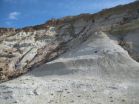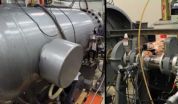(Press-News.org) New research from the University of Adelaide has discovered a high prevalence of vitamin B12 deficiency among refugees, prompting calls for refugees to be routinely screened for the problem soon after they arrive.
Vitamin B12 deficiency is a sign of severe malnourishment and can result in permanent damage to the nervous system. For women of child-bearing age, vitamin B12 deficiency can lead to developmental defects in their unborn children. If left untreated, the deficiency could be fatal.
In the first study of its kind in the world, researchers from the University of Adelaide's School of Population Health studied more than 900 newly arrived refugees in Australia and found that 16.5% had vitamin B12 deficiency.
As many as one third of the refugees tested from Iran and Bhutan, and one quarter of those from Afghanistan, suffered from the deficiency.
The results of this study – which have implications for other countries such as the United States and Canada – are now published online in the international journal PLOS ONE.
"Vitamin B12 deficiency is a serious problem," says study leader Dr Jill Benson AM, Director of the Health in Human Diversity Unit at the University of Adelaide.
"Although we were expecting to find a reasonable number of vitamin B12 deficiency cases in this study, we were not expecting to see such a significant problem.
"You would not expect to see this kind of deficiency occurring in the population of a typical Western nation. What we're dealing with here is a highly vulnerable population, people who come from countries that experience extreme food security issues, and therefore they suffer from a wide range of medical conditions.
"Screening for vitamin B12 is not currently part of the standard health check for refugees entering Australia, but based on the results of our study, we firmly believe this screening should occur," Dr Benson says.
"With the United States, Canada and Australia being the three biggest nations receiving refugees from the same source countries, it stands to reason that this health problem will also be strongly prevalent among refugees in North America.
"Health authorities in each of these countries should consider providing specialized health services to refugees on arrival and in the months following their arrival," she says.
Dr Benson says general practitioners also require specialist training in refugee health. "Because of the wide variety of health conditions they might bring from their countries of origin, refugees require a much broader spectrum of health investigation than GPs may be used to," she says.
The results of this study will also be discussed at the North American Refugee Health Conference in Toronto in June. Clinicians involved in the Refugee Health Network of Australia collaborated on this research.
INFORMATION:
Dr Jill Benson
Director, Health in Human Diversity Unit
School of Population Health
The University of Adelaide
Phone: +61 8 8313 6277
jill.benson@adelaide.edu.au
END
Dining on field grasses would be ruinous to human teeth, but mammals such as horses, rhinos and gazelles evolved long, strong teeth that are up to the task.
New research led by the University of Washington challenges the 140-year-old assumption that finding fossilized remains of prehistoric animals with such teeth meant the animals were living in grasslands and savannas. Instead it appears certain South American mammals evolved the teeth in response to the gritty dust and volcanic ash they encountered while feeding in an ancient tropical forest.
The new work was conducted ...
CAMBRIDGE, MA -- Bringing the concept of an "artificial leaf" closer to reality, a team of researchers at MIT has published a detailed analysis of all the factors that could limit the efficiency of such a system. The new analysis lays out a roadmap for a research program to improve the efficiency of these systems, and could quickly lead to the production of a practical, inexpensive and commercially viable prototype.
Such a system would use sunlight to produce a storable fuel, such as hydrogen, instead of electricity for immediate use. This fuel could then be used on demand ...
Human activities are not the primary cause of arsenic found in groundwater in Bangladesh.
Instead, a team of researchers from Lawrence Livermore National Laboratory, Barnard College, Columbia University, University of Dhaka, Desert Research Institute and University of Tennessee found that the arsenic in groundwater in the region is part of a natural process that predates any recent human interaction, such as intensive pumping.
The results appear in the March 4 edition of the Proceedings of the National Academy of Sciences.
Millions of people in Bangladesh and neighboring ...
(Boston) – Researchers at Boston University School of Medicine (BUSM) and VA Boston Healthcare System (VA BHS) have found that cognitive behavioral therapy (CBT) can help relieve pain for people with painful diabetic neuropathies. The study, which is the first of its kind to examine this treatment for people with type II diabetes mellitus, is published in the March issue of the Journal of Pain.
Type II diabetes mellitus is the most common form of the disease and affects more than 20 million Americans. The onset of type II diabetes mellitus is often gradual, occurring ...
CAMBRIDGE, MA -- Since the mid-1800s, doctors have used drugs to induce general anesthesia in patients undergoing surgery. Despite their widespread use, little is known about how these drugs create such a profound loss of consciousness.
In a new study that tracked brain activity in human volunteers over a two-hour period as they lost and regained consciousness, researchers from MIT and Massachusetts General Hospital (MGH) have identified distinctive brain patterns associated with different stages of general anesthesia. The findings shed light on how one commonly used ...
VIDEO:
NASA scientists at the Goddard Cosmic Ice Lab are studying a kind of chemistry almost never found on Earth. The extreme cold, hard vacuum, and high radiation environment of space...
Click here for more information.
Behind locked doors, in a lab built like a bomb shelter, Perry Gerakines makes something ordinary yet truly alien: ice. This isn't the ice of snowflakes or ice cubes. No, this ice needs such intense cold and low pressure to form that the right conditions ...
Back in 2010, the ideas behind a squid's sticky tendrils and Spiderman's super-strong webbing were combined to create a prototype for the first remote device able to stop vehicles in their tracks: the Safe, Quick, Undercarriage Immobilization Device (SQUID). At the push of a button, spiked arms shot out and entangled in a car's axles—bringing a racing vehicle to a screeching halt.*
The need to stop vehicles remotely was identified by the law enforcement community. With funding from Homeland Security's Science & Technology Directorate, and the expertise of the engineers ...
SEATTLE—Researchers used electronic health records to identify Group Health patients who weren't screened regularly for cancer of the colon and rectum—and to encourage them to be screened. This centralized, automated approach doubled these patients' rates of on-time screening—and saved health costs—over two years. The March 5 Annals of Internal Medicine published the randomized controlled trial.
"Screening for colorectal cancer can save lives, by finding cancer early—and even by detecting polyps before cancer starts," said study leader Beverly B. Green, MD, MPH. "But ...
Studied for decades for their essential role in making proteins within cells, several amino acids known as tRNA synthetases were recently found to have an unexpected – and critical – additional role in cancer metastasis in a study conducted collaboratively in the labs of Karen Lounsbury, Ph.D., University of Vermont professor of pharmacology, and Christopher Francklyn, Ph.D., UVM professor of biochemistry. The group determined that threonyl tRNA synthetase (TARS) leads a "double life," functioning as a critical factor regulating a pathway used by invasive cancers to induce ...
VANCOUVER, Wash.—Fishers near marine protected areas end up traveling farther to catch fish but maintain their social and economic well-being, according to a study by fisheries scientists at Washington State University and in Hawaii.
The study, reported in the journal Biological Conservation, is one of the first to look closely at how protected areas in small nearshore fisheries can affect where fishers operate on the ocean and, as a consequence, their livelihood.
"Where MPAs are located in relation to how fishers operate on the seascape is critical to understand for ...



